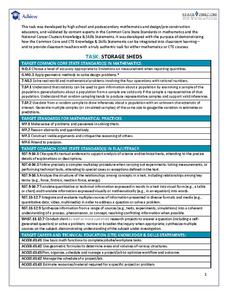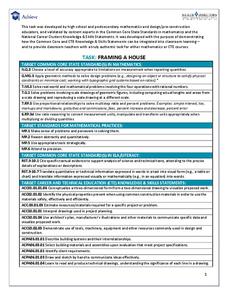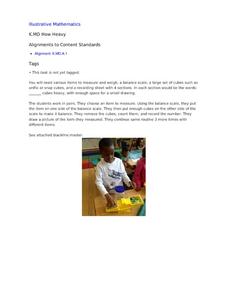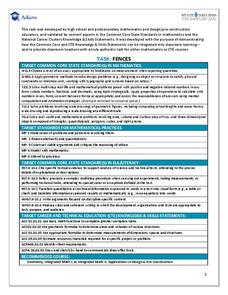Balanced Assessment
L to Scale
Explore the meaning of scale in relation to actual size through this activity. Young mathematicians examine scale models and determine their relationship to each other. They also find perimeter and area of each model.
EngageNY
Changing Scales
Pupils determine scale factors from one figure to another and the scale factor in the reverse direction. Scholars compute the percent changes between three figures.
Balanced Assessment
How Big is Big?
Now you can create your own monster movie. Learners estimate the size of a scale model monster given comparison statements and analyze these estimates to determine if the scale model accurately portrays a lizard.
CCSS Math Activities
Smarter Balanced Sample Items: 7th Grade Math – Target E
How well do your classes understand scale? You'll certainly know after they answer the set of eight questions from an informative and helpful presentation. Questions include items from coordinate geometry, similar triangles, and scale...
Achieve
Task: Storage Sheds
Bridge the gap between mathematics and Career Technical Education. Pupils research the cost associated with building storage sheds and analyze possible profit. They build scale models and determine if building and selling the sheds is a...
Achieve
Framing a House
If members of your class wonder where they can use the math they learn in middle school, let them discover the answer. Learners apply geometry concepts of scale and measure to calculate the costs of framing a house addition.
Noyce Foundation
Which is Bigger?
To take the longest path, go around—or was that go over? Class members measure scale drawings of a cylindrical vase to find the height and diameter. They calculate the actual height and circumference and determine which is larger.
Balanced Assessment
Ostrich and Seahorse
Examine the relationship between ratios and scale. Young math scholars compare ratios of two models. They use the ratios to make a comparison between the two models. Each image uses a different scale, which requires learners to think...
EngageNY
Mid-Module Assessment Task - Geometry (Module 2)
Challenge: create an assessment that features higher level thinking from beginning to end. A ready-made test assesses knowledge of dilations using performance tasks. Every question requires a developed written response.
Mathematics Assessment Project
Linear Graphs
A line is a line is a line. As a middle school assessment task, learners first identify graphs of given linear equations. They then identify the equations that represent real-world situations.
Illustrative Mathematics
Christo’s Building
Hook your charges on how to solve a real-world art problem with mathematics by showing works of Christo. You can find eye-catching images on the Christo and Jeanne Claude webpage. Here, math learners help Jean Claude and Christo prepare...
Curated OER
How Heavy
Break out the balances for this primary grade lesson on weight measurement. Using common elementary school manipulatives like unifix or snap cubes, young mathematicians determine the weight of four different classroom objects. A graphic...
Illustrative Mathematics
Seeing is Believing
How many visual models can be used to show multiplication? Three basic kinds of models can be used to represent and explain the equation 4 x (9 + 2). The commentary section provides description and graphics to explain the set...
Noyce Foundation
Photographs
Scaling needs to be picture perfect. Pupils use proportional reasoning to find the missing dimension of a photo. Class members determine the sizes of paper needed for two configurations of pictures in the short assessment task.
Illustrative Mathematics
Comparing Products
How can 5th graders show understanding that 30 x 225 is half of 60 x 225 without completing the computation? They can use an area model and draw it out. An array, or an open array, is an area model that allows for young learners to...
Achieve
Fences
Pupils design a fence for a backyard pool. Scholars develop a fence design based on given constraints, determine the amount of material they need, and calculate the cost of the project.
Achieve
Dairy Barn
Agriculture is truly a math-based profession! Help the dairy farmer determine the supplies needed to complete his barn. Using given dimensions, learners build equations and use units to determine the correct amount of materials.
Inside Mathematics
Population
Population density, it is not all that it is plotted to be. Pupils analyze a scatter plot of population versus area for some of the states in the US. The class members respond to eight questions about the graph, specific points and...
Inside Mathematics
Functions
A function is like a machine that has an input and an output. Challenge scholars to look at the eight given points and determine the two functions that would fit four of the points each — one is linear and the other non-linear. The...
Inside Mathematics
Swimming Pool
Swimming is more fun with quantities. The short assessment task encompasses finding the volume of a trapezoidal prism using an understanding of quantities. Individuals make a connection to the rate of which the pool is filled with a...
EngageNY
Population Problems
Find the percent of the population that meets the criteria. The 17th segment of a 20-part unit presents problems that involve percents of a population. Pupils use tape diagrams to create equations to find the percents of subgroups...
McGraw Hill
Glencoe: Self Check Quizzes 1 Scale Drawings and Models
Use Glencoe's randomly generated self-checking quiz to test your knowledge of scale drawings and models. Each question has a "Hint" link to help. Choose the correct answer for each problem. At the bottom of the page click the "Check It"...
McGraw Hill
Glencoe: Self Check Quizzes 3 Scale Drawings and Models
Use Glencoe's Math Course 3 randomly generated self-checking quiz to test your knowledge of scale drawings and models. Each question has a "Hint" link to help. Choose the correct answer for each problem. At the bottom of the page click...
McGraw Hill
Glencoe Mathematics: Online Study Tools: Scale Drawings and Models
This site gives a short interactive quiz which allows students to self-assess their understanding of scale drawings and models.























